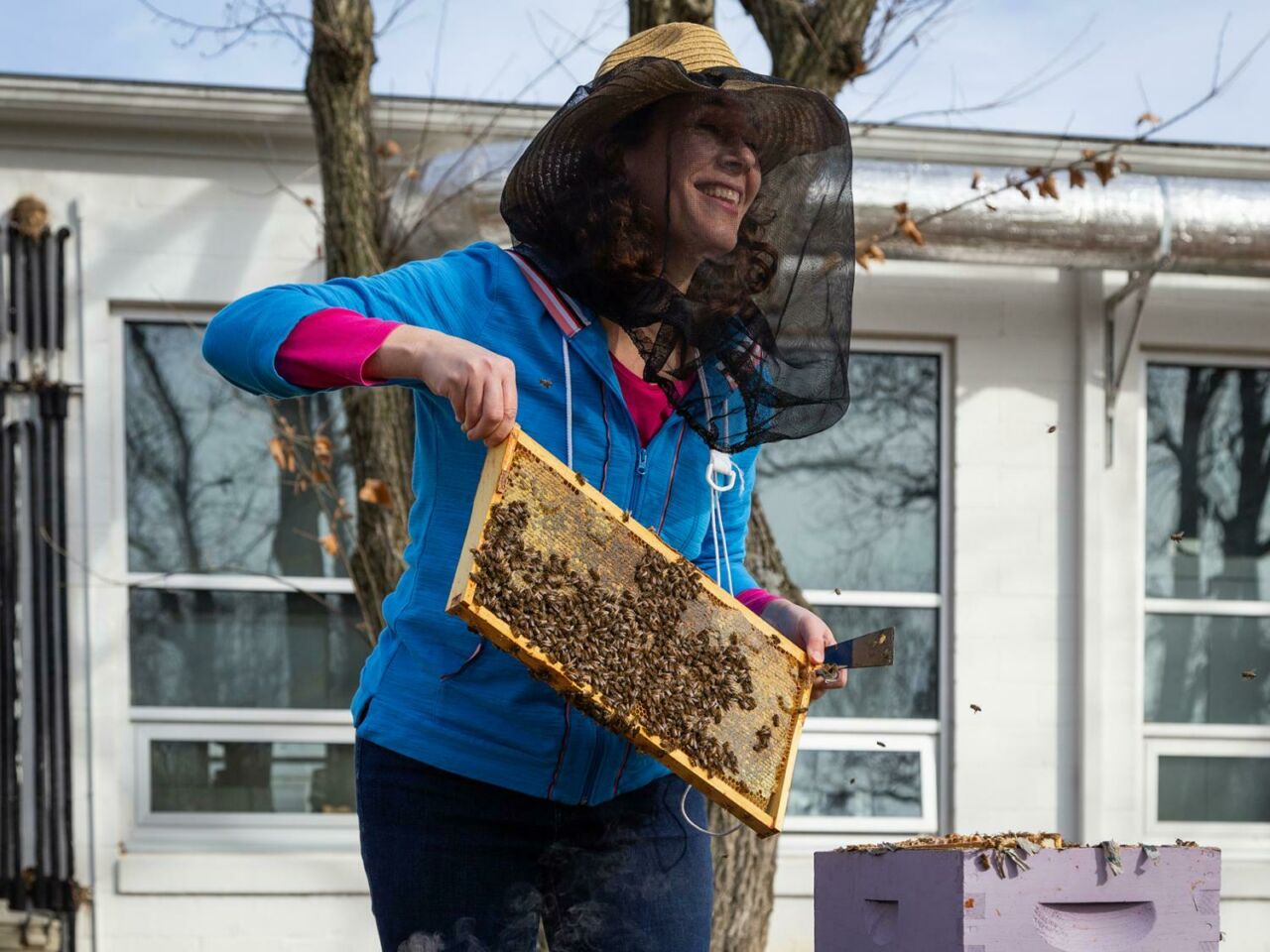April 26, 2023
Grozinger receives 2023 President’s Award for Excellence Academic Integration
Nominators say Grozinger is a gifted researcher who works on pressing global problems- bee behavior and conservation- who uses her position to educate the next generation of scientists as well as the general public. Grozinger’s research is interdisciplinary, bringing in colleagues from across the academic community and beyond.

This article was published April 11, 2023 in Penn State Today.
UNIVERSITY PARK, Pa. — Christina Grozinger, Publius Vergilius Maro Professor of Entomology, has been awarded the 2023 President’s Award for Excellence in Academic Integration.
The award is given to a full-time faculty member who has exhibited extraordinary achievement in the integration of teaching, research or creative accomplishment and service.
Nominators say Grozinger is a gifted researcher who works on pressing global problems — bee behavior and conservation — who uses her position to educate the next generation of scientists as well as the general public.
Grozinger’s research is interdisciplinary, bringing in colleagues from across the academic community and beyond. She uses her research as a platform for teaching, outreach, extension and training experts, nominators said.
Since joining Penn State in 2008, Grozinger continues to earn accolades. She’s a Fellow of the Entomological Society of America and the American Association for the Advancement of Science. In 2021, she earned the National Academy of Sciences Prize in Food and Agriculture Sciences for “helping the world understand how to address the pollinator crisis.”
Nominators called Grozinger’s approach “integrative” because it incorporates areas from genomics to ecology in a quest to better understand the behavior and health of bee populations, which are in rapid decline.
Grozinger’s research program explores the behavioral genomics and chemical ecology of bee social behavior, evaluates the responses of bees to different stressors, from pathogens to weather extremes, and develops approaches for managing landscapes to reduce these stresses. Grozinger leads the Beescape team — a collaboration among several universities nationwide — which is developing decision support tools to predict bee health at local scales so that the public, growers, land managers and conservationists can better understand and mitigate stresses. Grozinger’s research has led to more than $20 million in funding, six book chapters and 140 research articles that have received more than 16,000 citations.
As director of the Center for Pollinator Research and Insect Biodiversity Center at Penn State, Grozinger collaborates across nine colleges. She’s secured more than $1.5 million in endowments to fuel research, outreach, extension and scholarships.
Grozinger's work educating experts begins early. Together with Harland Patch, she teaches ENT 222 “Honey Bees and Humans," which was featured in Onward State as “The Bee Focused Gen Ed That Could Save the World.” She has also sought to integrate research on pollinator biology and health into K-12 education programs, by collaborating with Penn State’s Center for Science and Schools and Center for Immersive Experiences. Grozinger also led two graduate level programs — with funding from Penn State and the USDA — to support graduate students.
Her work extends to the general public. Grozinger promotes pollinator and biodiversity conservation with stakeholder groups and policymakers. She served on the Science Policy Committee for the Entomological Society of America and helped develop Pennsylvania’s Pollinator Protection Plan. She assisted in developing the four-acre Pollinator and Bird Garden at the Arboretum at Penn State, which welcomes more than 100,000 visitors a year. As a master gardener, Grozinger engages with this group to support pollinator education and the development of pollinator gardens across the state.
“Dr. Grozinger has had remarkable success integrating her activities in ways that magnify the impact of her programs,” a nominator said. “She coordinates outreach activities with stakeholders, oversees websites, coordinates and disseminates sponsor funds through awards to students, and coordinates collaboration among her peers. In my 35 years as a researcher, teacher and academic administrator, I am unaware of any individual who has done more to change public perceptions and raise awareness of these critical issues.”
